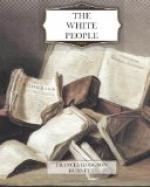My piper’s name was Feargus, and in time I found out that the guests from London could not endure the noise he made when he marched to and fro, proudly swinging his kilts and treading like a stag on a hillside. It was an insult to tell him to stop playing, because it was his religion to believe that The Muircarrie must be piped proudly to; and his ancestors had been pipers to the head of the clan for five generations. It was his duty to march round the dining-hall and play while the guests feasted, but I was obliged in the end to make him believe that he could be heard better from the terrace—because when he was outside his music was not spoiled by the sound of talking. It was very difficult, at first. But because I was his chieftainess, and had learned how to give orders in a rather proud, stern little voice, he knew he must obey.
Even this kind of thing may show that my life was a peculiar one; but the strangest part of it was that, while I was at the head of so many people, I did not really belong to any one, and I did not know that this was unusual. One of my early memories is that I heard an under-nursemaid say to another this curious thing: “Both her father and mother were dead when she was born.” I did not even know that was a remarkable thing to say until I was several years older and Jean Braidfute told me what had been meant.
My father and mother had both been very young and beautiful and wonderful. It was said that my father was the handsomest chieftain in Scotland, and that his wife was as beautiful as he was. They came to Muircarrie as soon as they were married and lived a splendid year there together. Sometimes they were quite alone, and spent their days fishing or riding or wandering on the moor together, or reading by the fire in the library the ancient books Angus Macayre found for them. The library was a marvelous place, and Macayre knew every volume in it. They used to sit and read like children among fairy stories, and then they would persuade Macayre to tell them the ancient tales he knew—of the days when Agricola forced his way in among the Men of the Woods, who would die any savage death rather than be conquered. Macayre was a sort of heirloom himself, and he knew and believed them all.
I don’t know how it was that I myself seemed to see my young father and mother so clearly and to know how radiant and wildly in love they were. Surely Jean Braidfute had not words to tell me. But I knew. So I understood, in a way of my own, what happened to my mother one brilliant late October afternoon when my father was brought home dead—followed by the guests who had gone out shooting with him. His foot had caught in a tuft of heather, and his gun in going off had killed him. One moment he had been the handsomest young chieftain in Scotland, and when he was brought home they could not have let my mother see his face.




